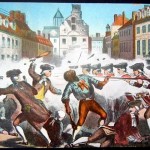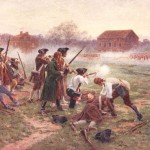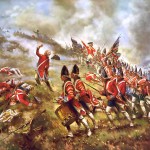posted by Writer on May 4
 “Therefore, brothers, stand fast and hold to the traditions you were taught, whether by word or our epistle.” 2 Thessalonians 2:15
“Therefore, brothers, stand fast and hold to the traditions you were taught, whether by word or our epistle.” 2 Thessalonians 2:15
There’s quite a difference between how our ancestors and this generation confronted tyranny.
Our forefathers loathed British royalty intruding into their lives. When they realized George III usurped authority that rightfully wasn’t his, they became defiant. Let’s take a quick stroll to show you what I mean.
March 5, 1770 – Our forefathers were livid because British troops occupied Boston. One night a crowd formed to protest this and troops were called to keep order. With bayonets fixed they kept the crowd at bay, but the colonists showed their disdain by pelting the soldiers with snowballs. One struck a soldier who then fired on the crowd. In a classic case of ‘monkey see, monkey do’ other soldiers opened up, leaving five men dead. The people were incensed, “stood their ground and only dispersed after being assured there would be a legitimate investigation into what we call today the Boston Massacre.” (1)
April 19, 1775 – As British troops approached Lexington intent confiscating arms, Captain John Parker said; “Stand your ground! Don’t fire unless fired upon. But if they want to have war, let it begin here.” Words were exchanged, and tradition tells us someone fired a shot from a pistol. According to Peter Marshall and David Manuel, the only ones carrying pistols were British officers. The skirmish, which began the Revolution, lasted less than fifteen minutes where the majority of men from Lexington, including Jonathan Harrington, Issac Muzzey and Jonas Parker, were killed. (2)
Captain John Parker said; “Stand your ground! Don’t fire unless fired upon. But if they want to have war, let it begin here.” Words were exchanged, and tradition tells us someone fired a shot from a pistol. According to Peter Marshall and David Manuel, the only ones carrying pistols were British officers. The skirmish, which began the Revolution, lasted less than fifteen minutes where the majority of men from Lexington, including Jonathan Harrington, Issac Muzzey and Jonas Parker, were killed. (2)
![bunker_hill_lg[1]](http://www.walkingthepoint.com/wp-content/uploads/2013/05/bunker_hill_lg11-150x150.jpg) June 17, 1775 Colonel’s Israel Putnam and William Prescott led the Colonists against British forces after learning of General Gage’s plan to occupy Bunker Hill. Marshall and Manuel believe God providentially intervened and allowed them to discover the plot. (3) The Redcoats made three advances up the hill, on the third march the Colonists had to retreat because they ran low on ammunition. But before doing so, they stood and engaged the soldiers in hand-to-hand combat. Even though the British took the hill that day they paid a heavy price and suffered 1,054 causalities, while confidence among the Yankees grew.
June 17, 1775 Colonel’s Israel Putnam and William Prescott led the Colonists against British forces after learning of General Gage’s plan to occupy Bunker Hill. Marshall and Manuel believe God providentially intervened and allowed them to discover the plot. (3) The Redcoats made three advances up the hill, on the third march the Colonists had to retreat because they ran low on ammunition. But before doing so, they stood and engaged the soldiers in hand-to-hand combat. Even though the British took the hill that day they paid a heavy price and suffered 1,054 causalities, while confidence among the Yankees grew.  General Burgoyne later wrote, “the retreat was no rout; it was covered with bravery and military skill.” (4)
General Burgoyne later wrote, “the retreat was no rout; it was covered with bravery and military skill.” (4)
It was an evil day then, just as it is today. But, we’re required to stand. Why did the people in Boston cower on April 19, 2013? Maybe it’s because Christians have failed to do something that God through Peter told us we must add to our faith (2 Peter 1:5). It’s called virtue. This is also a quality we must insist that our elected representatives, at all levels, possess before casting a vote on their behalf.
Webster defines it as “bravery, valor, moral good, moral excellence, and the practice of moral duties from sincere love to God and His law. (5)
Sam Adams, the Father of the Revolution, prophetically warned; “A general dissolution of principles and manners will more surely overthrow the liberties of America than the whole force of the common enemy. While the people are virtuous they cannot be subdued; but when once they lose their virtue they will be ready to surrender their liberties to the first external or internal invader.” (6)
Maybe that’s what happened.
(1) American Liberty died in Boston, where it was born, by Thomas Lucente; (2) The Light and The Glory (TLTG), Peter Marshall and David Manuel p. 271-275; (3) Ibid TLTG, p.278; (4) Ibid TLTG p.281 ; (5) Noah Webster, An American Dictionary of the English Language, p. 1238 (1860); (6) The Myth of Separation, David Barton, p. 247.
Leave a Reply